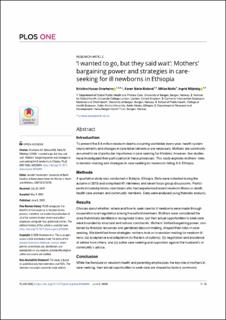| dc.contributor.author | Onarheim, Kristine Husøy | |
| dc.contributor.author | Moland, Karen Marie Ingeborg | |
| dc.contributor.author | Molla, Mitike | |
| dc.contributor.author | Miljeteig, Ingrid | |
| dc.date.accessioned | 2021-05-31T09:39:15Z | |
| dc.date.available | 2021-05-31T09:39:15Z | |
| dc.date.created | 2020-08-06T13:50:48Z | |
| dc.date.issued | 2020 | |
| dc.Published | PLOS ONE. 2020, 15:e0233594 (6), 1-15. | |
| dc.identifier.issn | 1932-6203 | |
| dc.identifier.uri | https://hdl.handle.net/11250/2757018 | |
| dc.description.abstract | Introduction
To prevent the 2.6 million newborn deaths occurring worldwide every year, health system improvements and changes in care-taker behaviour are necessary. Mothers are commonly assumed to be of particular importance in care-seeking for ill babies; however, few studies have investigated their participation in these processes. This study explores mothers’ roles in decision making and strategies in care-seeking for newborns falling ill in Ethiopia.
Methods
A qualitative study was conducted in Butajira, Ethiopia. Data were collected during the autumn of 2015 and comprised 41 interviews and seven focus group discussions. Participants included primary care-takers who had experienced recent newborn illness or death, health care workers and community members. Data were analysed using thematic analysis.
Results
Choices about whether, where and how to seek care for ill newborns were made through cooperation and negotiation among household members. Mothers were considered the ones that initially identified or recognised illness, but their actual opportunities to seek care were bounded by structural and cultural constraints. Mothers’ limited bargaining power, contained by financial resources and gendered decision making, shaped their roles in care-seeking. We identified three strategies mothers took on in decision making for newborn illness: (a) acceptance and adaptation (to the lack of options), (b) negotiation and avoidance of advice from others, and (c) active care-seeking and opposition against the husband’s or community’s advice.
Conclusion
While the literature on newborn health and parenting emphasizes the key role of mothers in care-seeking, their actual opportunities to seek care are shaped by factors commonly beyond their control. Efforts to promote care-seeking for ill children should recognise that mothers’ capabilities to make decisions are embedded in gendered social processes and financial power structures. Thus, policies should not only target individual mothers, but the wider decision making group, including the head of households and extended family. | en_US |
| dc.language.iso | eng | en_US |
| dc.publisher | Public Library of Science | en_US |
| dc.rights | Navngivelse 4.0 Internasjonal | * |
| dc.rights.uri | http://creativecommons.org/licenses/by/4.0/deed.no | * |
| dc.title | ‘I wanted to go, but they said wait’: Mothers’ bargaining power and strategies in careseeking for ill newborns in Ethiopia | en_US |
| dc.type | Journal article | en_US |
| dc.type | Peer reviewed | en_US |
| dc.description.version | publishedVersion | en_US |
| dc.rights.holder | Copyright 2020 Onarheim et al. | en_US |
| dc.source.articlenumber | e0233594 | en_US |
| cristin.ispublished | true | |
| cristin.fulltext | original | |
| cristin.qualitycode | 1 | |
| dc.identifier.doi | 10.1371/journal.pone.0233594 | |
| dc.identifier.cristin | 1822039 | |
| dc.source.journal | PLOS ONE | en_US |
| dc.source.40 | 15:e0233594 | |
| dc.source.14 | 6 | |
| dc.identifier.citation | PLOS ONE. 2020, 15 (6), e0233594. | en_US |
| dc.source.volume | 15 | en_US |
| dc.source.issue | 6 | en_US |

